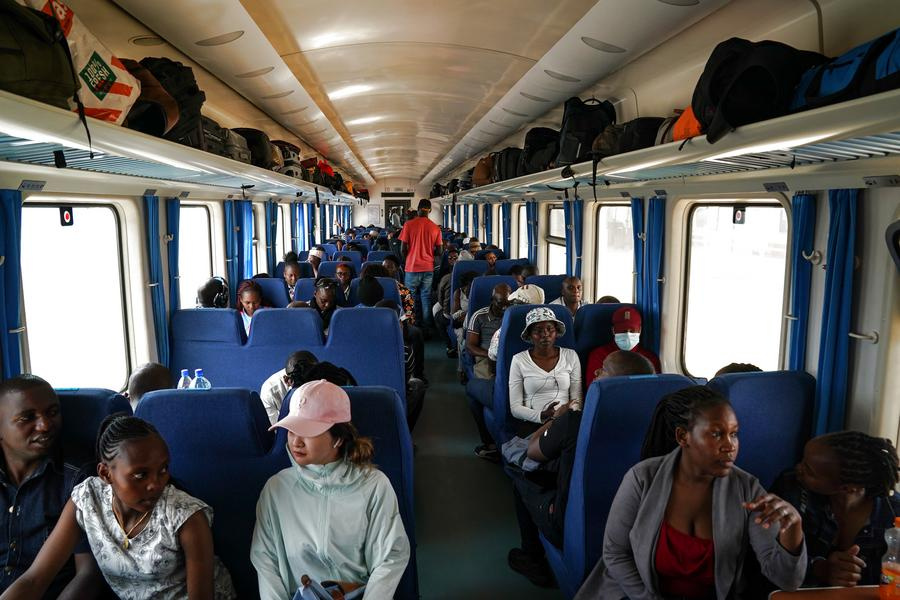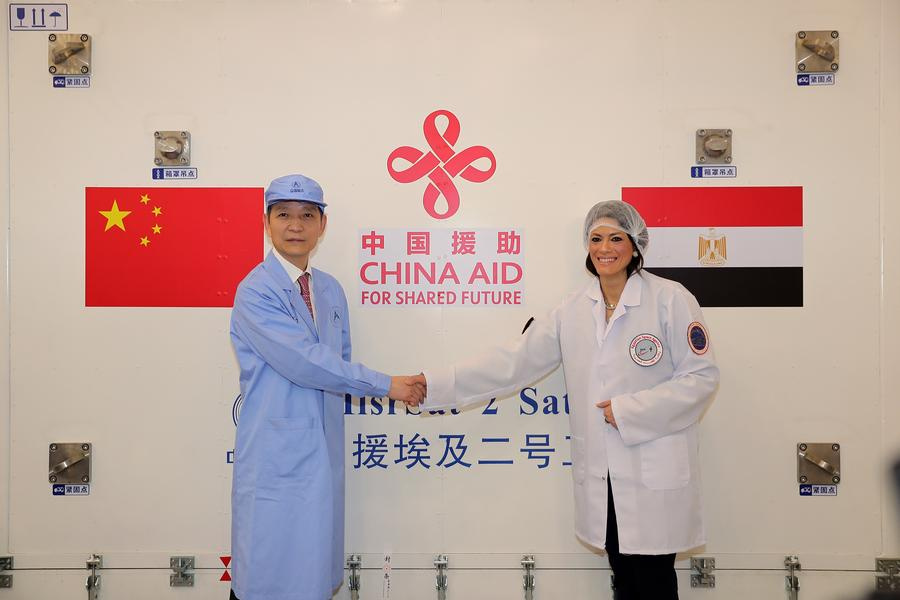China-Africa cooperation bolsters common development of Global South

Passengers are seen in the train to Mombasa at Nairobi Terminus Station of the China built Mombasa-Nairobi Standard Gauge Railway (SGR) in Nairobi, Kenya, Sept. 20, 2023. [Xinhua/Han Xu]
BEIJING -- Over the years, the solidarity and cooperation between China, the largest developing country, and Africa, the continent with the most developing countries, have continued to benefit the nations involved, setting an example for how Global South countries can unite to foster common growth and sustainable development.
At the 2024 Summit of the Forum on China-Africa Cooperation (FOCAC), scheduled in Beijing from Sept. 4 to 6, China and African nations will renew their friendship and further practical cooperation to jointly advance modernization and build a high-level community with a shared future.
China-Africa cooperation has withstood the test of time. From Cairo to Johannesburg, and across sectors from healthcare to infrastructure, China and Africa have united to overcome challenges and pursue more balanced, inclusive development.
According to China's Ministry of Commerce, China has remained Africa's largest trading partner for 15 consecutive years, with bilateral trade reaching a record 282.1 billion U.S. dollars in 2023.
Chinese enterprises have helped strengthen Africa's industrial foundation through the construction of industrial parks, capacity building, technology transfer and talent cultivation across various sectors, including agriculture, manufacturing, the digital economy, medicine, logistics and infrastructure.
Meanwhile, China has carried out hundreds of clean energy and power grid projects in Africa, helping African countries better harness solar energy, hydropower and wind energy. This has brought new opportunities for countries in the Global South to realize leapfrog development.
African products such as coffee from Ethiopia, wines from South Africa and cosmetics from Senegal are becoming increasingly popular in the Chinese market after the implementation of trade facilitation measures.
China and African countries share historical experiences of suffering imperialist invasion, a common need for social and economic development, and similar perspectives and demands regarding the international order and global governance. Both sides have always understood and respected each other.
Unlike Western powers that often interfere in the internal affairs of African countries, China proposes a "five-no" approach to cooperation with African countries: no interference in their pursuit of development paths that fit their national conditions, no interference in their internal affairs, no imposition of will, no attachment of political strings to assistance, and no seeking of selfish political gains in investment and financing cooperation.
China's commitment reflects its respect for African countries, which, having achieved political independence from Western colonizers, are eager to pursue economic growth through their own efforts.

Egyptian Minister of International Cooperation Rania Al-Mashat (R) shakes hands with Chinese Ambassador to Egypt Liao Liqiang after a delivery ceremony of two prototype satellites of the MisrSat II satellite project at the Egyptian Space Agency near New Administrative Capital, Egypt, on June 25, 2023. [Xinhua/Wang Dongzhen]
However, Africa still faces many challenges in achieving its goal of development. According to the United Nations, out of the 45 least developed countries in the world, 33 are in Africa. By 2030, an estimated 582 million people will be chronically undernourished, with half of them in Africa.
In addition, many Global South countries have long grappled with challenges such as low per-capita income, delayed industrialization and limited political influence in the global governance system, all of which severely undermine their growth potential.
The root cause of these issues is the unequal environment created by historical colonialism and the emerging unilateralism from certain Western powers.
China and African countries have worked together to transform this environment, promote multilateralism, and defend the development rights of Global South nations.
For example, China has supported the reform of the UN Security Council to address historical injustices against Africa, led efforts to include the African Union in the G20, and advocated enhanced cooperation with African countries through the BRICS Plus mechanism.
China and Africa also issued a declaration on climate change cooperation in 2021, pledging to safeguard the reasonable rights and interests of China and Africa, as well as other developing countries, and urging developed countries to fulfill their funding obligations to help developing countries, especially African countries, cope with climate change.
These efforts have strengthened Africa's presence and voice in international affairs, providing platforms and opportunities for African countries to participate in global governance as part of the Global South, thereby fostering a new pattern of win-win cooperation among Global South nations.
Amadou Diop, a Senegalese expert on China, said that through increasing investment and a rebalancing of international relations, the China-Africa cooperation has shaped new international relations between the two sides and influenced global policy directions and governance methods worldwide.
The fruits of China-Africa cooperation highlight China's commitment to its friendship with other Global South countries and their mutual development. They exemplify a model of South-South cooperation that addresses the unique challenges and aspirations of developing nations, which will be showcased again at the upcoming FOCAC summit.
Working together, China and Africa will continue to exemplify Global South cooperation, advance modernization suiting each country's conditions, and strengthen multilateralism for greater say in global governance.
The views don't necessarily reflect those of Qiushi Journal.
























